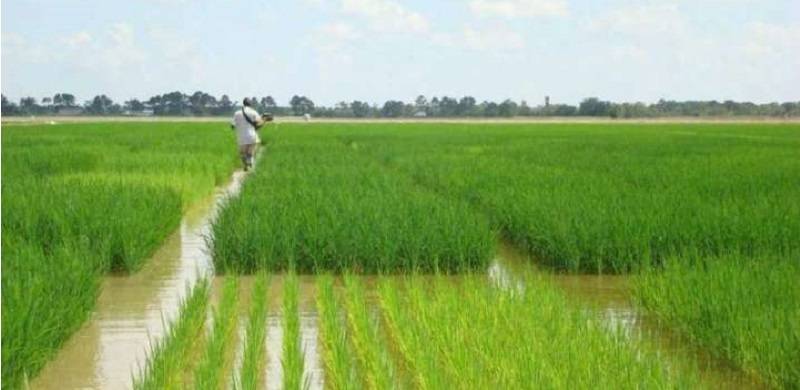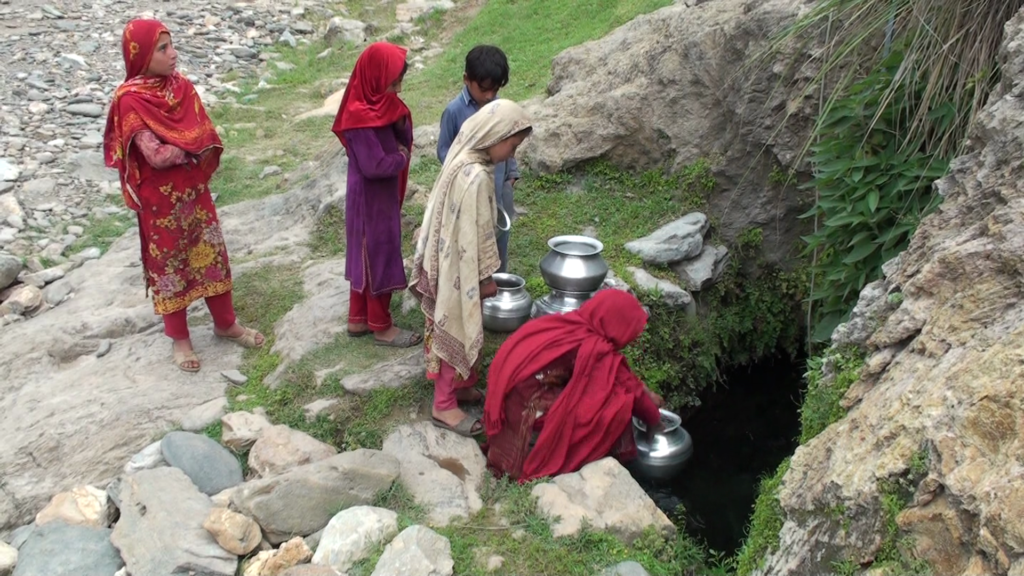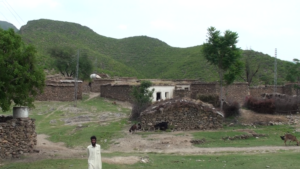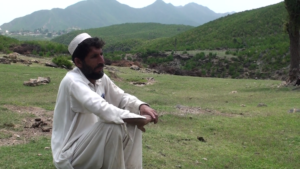
Eight out of 15 families living in Manga Khel village of Malakand district have left their ancestral homes due to a scarcity of water and contamination over the past few years, while those remaining behind are also planning to leave for good.
Manga Khel is a small village in Malakand district and the majority of its population depends on agriculture for their livelihood. They also rear cattle and collect wild shrubs which they sell in the bazaar.
Gulab Noor, a local farmer says that he grows crops on his fields for a living and the yield was dependent on rains. “If it rains, the crops are good, otherwise, they face drought,” he says, adding that last year their crops were destroyed due to a lack of rains.
Mr. Noor says that the village had a single well, which was their only source of water, and it also depended on rains for storage of water. Both the humans as well their cattle relied on this well for their water needs.
“There is no proper sanitation system in our village and the drainage from homes get mixed with the well water due to absence of drainage and we use this contaminated well water for our daily use for drinking, cooking and washing” he says.
Over the past five years, their crops have largely followed weather patterns, where less or no rainfall meant less or no crops and water. “When there are no rains, our women carry water on their heads from a canal, about a mile away from the village,” he says, adding that canal water was also contaminated but they had no other option other than to use it for their sustenance.
Mr Noor’s 70 year-old-mother said that they have been living in this village for the past 30 to 40 years and used the same well. “Not only humans but their animals also drink water from here,” she says.
She says that water from the well was not good for health and that they were suffering from stomach ailments.
Pakistan is one of the signatory countries of Sustainable Development Goals (SDGs), which aims to overcome and achieve 17 major targets by 2030. Goals 6 and 13 call for urgent action to combat climate change and its impact, and ensuring availability and sustainable management of water an d sanitation for all.
d sanitation for all.
United Nations Development Programme (UNDP) estimates show that about 5.2 billion people or roughly 71 percent of the global population has access to clean drinking water in 2015, while 884 million people had no access to even clean drinking water.
Global Climate Risk Index Report 2020 placed Pakistan in fifth position on the list of countries most vulnerable ble to climate change. UNICEF estimates that nearly 70 percent of households of the country were drinking bacterially contaminated water and about 53,000 Pakistani children less than five years die annually from diarrhea due to poor water and sanitation.
ble to climate change. UNICEF estimates that nearly 70 percent of households of the country were drinking bacterially contaminated water and about 53,000 Pakistani children less than five years die annually from diarrhea due to poor water and sanitation.
According to the Khyber-Pakhtunkhwa (KP) Climate Change Policy 2016, the province was one of the most affected and vulnerable to climate change among other provinces of Pakistan.
Asif Mohmand, a Peshawar based environmental journalist says that Pakistan was one of signatories to the Paris Agreement and under the agreement it was bound to contribute and to take measures to stop the rise in temperature. He says that though Pakistan was the lowest carbon producer, still it is the most vulnerable country to climate change and the reason behind the drastic effects of climate change on Pakistan were poor planning, weak policies and the lack of implementation.
He says 196 nations, including Pakistan, who had signed the Convention on Biol ogical Diversity (CBD) have failed to do enough for the sustainable environment. None of the signatory countries meet Aichi biodiversity 2020 targets. Pakistan has also set targets but couldn't meet them, and especially KP which was one of the richest areas in terms of biodiversity suffered the most.
ogical Diversity (CBD) have failed to do enough for the sustainable environment. None of the signatory countries meet Aichi biodiversity 2020 targets. Pakistan has also set targets but couldn't meet them, and especially KP which was one of the richest areas in terms of biodiversity suffered the most.
He says that KP Climate Change Policy 2016 was a shadow policy because its meeting minutes are not being published to date and it is yet to be implemented properly while the policymakers also failed to include the direct opinion of farmers and indigenous communities in it.
KP's biodiversity leaves it especially vulnerable to climate change. In fact, KP's northern areas have recently witnessed drought in the shape of dry springs and change in rain patterns due to which people have started migration from their forefather areas, Asif Mohmand adds.
An analysis published in the Guardian notes, more than 1 billion people face being displaced within 30 years as the climate crisis and rapid population growth drive a n increase in migration with “huge impacts” for both the developing and developed worlds.
n increase in migration with “huge impacts” for both the developing and developed worlds.
Mr. Mohmand says that there was a strong need for awareness regarding climate change to the local communities and local governments. Pakistan is already the most affected country from climate change and it would be more affected if the new policies are not made, localized and implemented properly.
Mr. Noor says that they don’t want to live any longer in their village on a single well dependent on rainwater. “Our agriculture also needs timely rains and we need a proper sanitation system in this village, '' he says, adding that if his village faces further changes in rain patterns and the contamination of water issue is still there for coming years then they would also be compelled to leave it for good.
Manga Khel is a small village in Malakand district and the majority of its population depends on agriculture for their livelihood. They also rear cattle and collect wild shrubs which they sell in the bazaar.
Gulab Noor, a local farmer says that he grows crops on his fields for a living and the yield was dependent on rains. “If it rains, the crops are good, otherwise, they face drought,” he says, adding that last year their crops were destroyed due to a lack of rains.
Mr. Noor says that the village had a single well, which was their only source of water, and it also depended on rains for storage of water. Both the humans as well their cattle relied on this well for their water needs.

“There is no proper sanitation system in our village and the drainage from homes get mixed with the well water due to absence of drainage and we use this contaminated well water for our daily use for drinking, cooking and washing” he says.
Over the past five years, their crops have largely followed weather patterns, where less or no rainfall meant less or no crops and water. “When there are no rains, our women carry water on their heads from a canal, about a mile away from the village,” he says, adding that canal water was also contaminated but they had no other option other than to use it for their sustenance.
Mr Noor’s 70 year-old-mother said that they have been living in this village for the past 30 to 40 years and used the same well. “Not only humans but their animals also drink water from here,” she says.
She says that water from the well was not good for health and that they were suffering from stomach ailments.
Pakistan is one of the signatory countries of Sustainable Development Goals (SDGs), which aims to overcome and achieve 17 major targets by 2030. Goals 6 and 13 call for urgent action to combat climate change and its impact, and ensuring availability and sustainable management of water an
 d sanitation for all.
d sanitation for all.United Nations Development Programme (UNDP) estimates show that about 5.2 billion people or roughly 71 percent of the global population has access to clean drinking water in 2015, while 884 million people had no access to even clean drinking water.
Global Climate Risk Index Report 2020 placed Pakistan in fifth position on the list of countries most vulnerable
 ble to climate change. UNICEF estimates that nearly 70 percent of households of the country were drinking bacterially contaminated water and about 53,000 Pakistani children less than five years die annually from diarrhea due to poor water and sanitation.
ble to climate change. UNICEF estimates that nearly 70 percent of households of the country were drinking bacterially contaminated water and about 53,000 Pakistani children less than five years die annually from diarrhea due to poor water and sanitation.According to the Khyber-Pakhtunkhwa (KP) Climate Change Policy 2016, the province was one of the most affected and vulnerable to climate change among other provinces of Pakistan.
Asif Mohmand, a Peshawar based environmental journalist says that Pakistan was one of signatories to the Paris Agreement and under the agreement it was bound to contribute and to take measures to stop the rise in temperature. He says that though Pakistan was the lowest carbon producer, still it is the most vulnerable country to climate change and the reason behind the drastic effects of climate change on Pakistan were poor planning, weak policies and the lack of implementation.
He says 196 nations, including Pakistan, who had signed the Convention on Biol
 ogical Diversity (CBD) have failed to do enough for the sustainable environment. None of the signatory countries meet Aichi biodiversity 2020 targets. Pakistan has also set targets but couldn't meet them, and especially KP which was one of the richest areas in terms of biodiversity suffered the most.
ogical Diversity (CBD) have failed to do enough for the sustainable environment. None of the signatory countries meet Aichi biodiversity 2020 targets. Pakistan has also set targets but couldn't meet them, and especially KP which was one of the richest areas in terms of biodiversity suffered the most.He says that KP Climate Change Policy 2016 was a shadow policy because its meeting minutes are not being published to date and it is yet to be implemented properly while the policymakers also failed to include the direct opinion of farmers and indigenous communities in it.
KP's biodiversity leaves it especially vulnerable to climate change. In fact, KP's northern areas have recently witnessed drought in the shape of dry springs and change in rain patterns due to which people have started migration from their forefather areas, Asif Mohmand adds.
An analysis published in the Guardian notes, more than 1 billion people face being displaced within 30 years as the climate crisis and rapid population growth drive a
 n increase in migration with “huge impacts” for both the developing and developed worlds.
n increase in migration with “huge impacts” for both the developing and developed worlds.Mr. Mohmand says that there was a strong need for awareness regarding climate change to the local communities and local governments. Pakistan is already the most affected country from climate change and it would be more affected if the new policies are not made, localized and implemented properly.
Mr. Noor says that they don’t want to live any longer in their village on a single well dependent on rainwater. “Our agriculture also needs timely rains and we need a proper sanitation system in this village, '' he says, adding that if his village faces further changes in rain patterns and the contamination of water issue is still there for coming years then they would also be compelled to leave it for good.
